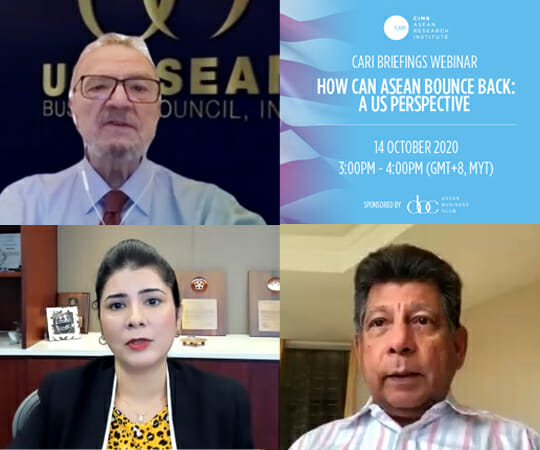A webinar by the CIMB ASEAN Research Institute (CARI) discussed how ASEAN can leverage upon Covid-19’s economic impact for its 4IR transformation, and ultimately how US interests coincide with ASEAN integration efforts.
Munir Majid, Chairman of CARI, emphasised that ASEAN must expedite its institutional decision-making process if it is to save lives and to come out of the Covid-19 pandemic faster and stronger, the others addressed the Pathway 225 proposals (A Pathway Towards Recovery and Hope for ASEAN) particularly on setting up the High-Level Special Commission, precisely to improve decision-making at this most challenging of times.
“The power of American businesses should not be neglected even if the general feel about the US is of a country in decline. Those businesses – their financial, technological and entrepreneurial strength – are not. They have to be engaged. They have to demonstrate they are not damaged goods and continue to have a global outlook,” said Munir.
Based on the World Bank’s projection in April 2020 and UNCTAD’s report on foreign direct investments (FDI), the Chairman felt both ASEAN and the US should strengthen bilateral trade ties as part of post-Covid-19 recovery.
“American firms can be strong partners in ASEAN’s Recovery and as ASEAN develops its post-pandemic recovery plan, the U.S. private sector is committed to ensuring the success of these comprehensive recovery efforts. We believe in the region’s future as a preferred trade and investment destination.
According to the World Bank’s projection in April 2020, Vietnam, Laos, the Philippines, Indonesia, and Myanmar are expected to register economic growth of between 2.1 percent and 4.9 percent, while Malaysia and Thailand would experience contractions of between 4.6 percent and 5.0 percent respectively.
Separately, the UNCTAD projected that foreign direct investments (FDI) into developing Asia would decline by up to 45 percent in 2020.
Furthermore, by approaching recovery strategically, ASEAN can position itself to not only bounce back from its current economic slump, but bounce ‘forward’ from the Covid-19 pandemic,” Ambassador Michael W. Michalak, Senior Vice President and Regional Managing Director of the US-ASEAN Business Council, who was present in the webinar pointed out.
Other important matters that were suggested are, to strengthen the region’s public health infrastructure, and accelerate digital transformation by supporting SMEs transition onto e-commerce platforms, as Covid-19 has exposed the need for business digitalisation to ensure economic sustainability.
“The severe economic ramifications brought about by Covid-19 and the subsequent need to protect livelihoods and tackling poverty should take precedence over political disagreements. Therefore, ASEAN and the US should uphold the global rules-based order which would facilitate bilateral and multilateral negotiations for this to happen” Munir concluded.









